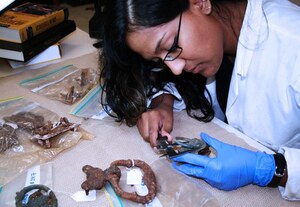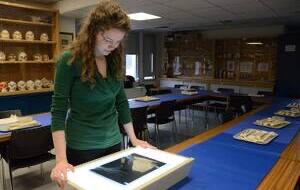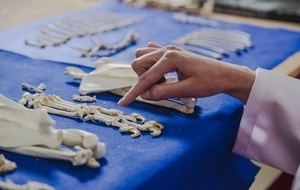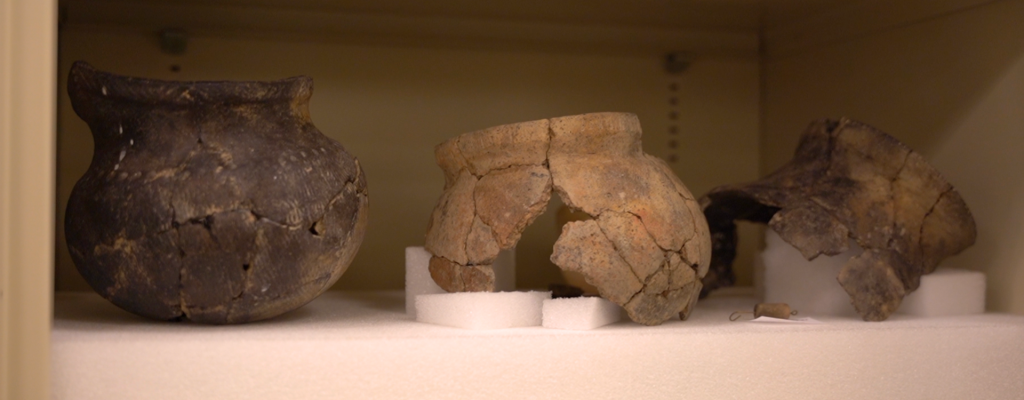Research
Research Programs
Departmental faculty and graduate students fit into one or more research programs (sub-fields).
Research Clusters
While the department covers four main Research Programs (sub-fields) in Anthropology, we also integrate our Research Programs in the below six key areas of expertise and investigation.
Ongoing Research Projects

How a Broken Food System Feeds Childhood Obesity and Undernutrition Read More About Tina Moffat's Project
In a world where food and food information seem more readily available than ever before, why is there still so much uncertainty around childhood nutrition?

Ancient DNA Suggests Woolly Mammoths Roamed the Earth More Recently Than Previously Thought View Tyler J. Murchie's Research
Tiny sediment samples contain an immense wealth of ancient environmental DNA.
Research Centers, Institutes, Labs & Facilities

Centre for Integrated Bioarcheological Research in Health, Diet, Disease & Migration (Bioarch-HDDM) Visit the Bioarch-HDDM Centrre
The centre enables comprehensive analysis of human remains in one location, using the most up-to-date technological equipment and provides an essential interface between field and lab-based research.
The portability of key equipment also permits access to otherwise inaccessible collections around the world.

Fisheries Archaeology Research Centre (FARC) Visit the Fisheries Archaeology Research Centre
The Fisheries Archaeology Research Centre supports research into long-term trends in fisheries production resulting from environmental change and human exploitation of fish and shellfish populations.
The work helps to address current concerns with global climate and environmental change and the effects of over-fishing in many different parts of the world.

McMaster Ancient DNA Centre Visit the Ancient DNA Centre
The McMaster Ancient DNA Centre approaches a wide range of evolutionary and molecular biological questions using DNA and proteins from archeological, paleontological and forensic remains. We use state-of-the-art techniques to extract and sequence these molecules, discerning origins and population histories of a wide range of species, both extinct and extant. This allows us to follow evolution in action, directly testing models based on modern theory and observation.

Sustainable Archaeology McMaster Visit Sustainable Archaeology McMaster
Sustainable Archaeology McMaster comprises an extensive archeological collections repository and laboratory stations and provides collections access and research space for consultant archeologists, researchers and descendant community members.
The Centre emphasises materials analyses, including petrographic, biogeochemical, zooarcheological and geoarcheological studies.

The Archaeology Teaching Lab Visit The Archaeology Teaching Lab
This Archaeology Teaching Lab is equipped with state-of-the-art audio visual aids to facilitate teaching and student presentations, as well as all the equipment required for analytical procedures in archaeology.
The classroom is also furnished with display cases that demonstrate the archeological process and highlight artifacts from the department’s archeological research collections.

The Shelley R. Saunders Biological Anthropology Teaching Lab Visit The Shelley R. Saunders Teaching Lab
The Shelley R. Saunders Biological Anthropology Teaching Lab represents a biocultural approach to understanding the human condition. The Lab houses the department’s comprehensive teaching collection with an emphasis on human skeletal biology, paleopathology and human evolution.
Teaching themes examine the study of human diversity, biological history and human evolution, and the biocultural factors that have shaped human biology and population in the present and the past.

The Archaeology Library Collection Download File
The Archaeology Library Collection Catalogue.

Lab for Interdisciplinary Research on Archaeological Ceramics (LIRAC) Visit The Archaeological Ceramics Labs
The Lab for Interdisciplinary Research on Archeological Ceramics was founded by Dr. Kostalena Michelaki in 2004, and is currently directed by Dr. Andy Roddick.

McMaster Archeological XRF Lab (MAX Lab) Visit The Max Lab
At the MAX Lab all artifacts are analyzed whole and non-destructively on the Thermo Scientific ARL Quant’X energy-dispersive x-ray fluorescence spectrometer, each piece having first been cleaned in an ultrasonic tank with distilled water for ten minutes. In attempting to provenance an artefact’s raw material, we compare its chemical signature with those of source samples run by the MAX Lab under the same conditions.
At present the lab has a large range of geological samples from obsidian sources across the Eastern Mediterranean and Mesoamerica, plus smaller quantities from the Western Mediterranean, Trans-Caucasia, Japan, Peru and the US.

McMaster Paleoethnobotany Research Facility (MPERF) Visit The Paleoethnobotany Research Facility
Research at the MPERF focuses on foodways and ethnoecology. Through generous funding provided by the Canadian Foundation for Innovation (CFI), the MPERF laboratories house extraction materials and microscopy equipment for macrobotanical analysis, extraction materials and microscopy equipment for microbotanical analysis, and a portable NanoRam spectrometer for limited chemical analysis of uncharred botanical specimens. Active projects include work in Guatemala, Honduras, Mexico, Bolivia, Peru, Scotland, and Ontario.

Sensory Ethnography Research Lab at McMaster Innovation Park
More information coming soon!
Latest News

Spring 2024 Anthropology Newsletter
Departmental News

Cal Biruk: Winner of the 2024 MSU Teaching Award
Departmental News












